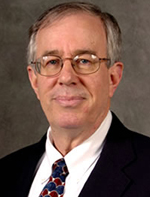By Celine Klosterman

DAVENPORT — Both faith and science play roles in helping people understand the “unfolding story” of the universe, John Haught told scholars, clergy and the general public at St. Ambrose University Feb. 27.
Distinguished research professor in theology at Georgetown University, he delivered St. Ambrose’s 2014 Chair of Catholic Studies lecture, “What is Really Going on in the Cosmos and What Should We Be Doing About It?”
One great question tackled by philosophers and theologians is whether there’s purpose in the universe. Haught defined purpose as “bringing about something of value.”
Why even bother with the question of cosmic purpose? As British philosopher Walter Terence Stace observed, “if the whole ‘scheme of things’ is pointless, then so are our individual lives,” Haught said.
But cosmic purpose may surpass full human comprehension. So faith relies on symbolic expressions, he said.
Religious leaders once compared understanding the universe to different levels of comprehending a book. A monkey sees printed words as merely black marks. A child may understand some of the book, but will find more meaning in it as he or she grows and receives education. “You can’t read the text without personal transformation,” Haught said.
While exploring what led to the development of conscious minds, astrophysicists traced the origin of elements necessary for life back to the Big Bang. If the newborn universe’s expansion rate or gravitational forces had been off infinitesimally, life — and thus mind — would never have evolved, Haught said. “Were conditions for the mind frontloaded into the universe?”
He suggested that the universe’s ongoing expansion means environmental stewardship is vital. “We need to take care and prepare for the possibilities the Creator may have for the future.”
Later, Haught explored English philosopher Alfred North Whitehead’s idea that the universe aims to intensify beauty, created by a harmony of novelty and order. “God persuades, not coerces, the universe to beauty,” Haught said. Thus, accidents and Darwinian evolution are possible. “God makes a universe that can make itself” — which risks evil and suffering, but also redemption through beauty.
So why have people not always shown interest in what’s going on in the universe? Jesuit priest Pierre Teilhard de Chardin observed that traditional spirituality has urged communion with God to the point of escape from the physical world. But as science developed, people began to see exciting phenomena in the natural world. A scientific worldview brought the risk of seeking communion only with the earth. But an alternate perspective proposes communing with God through the earth.
God is calling the universe to a new future, Haught said. “Even our most insignificant works are contributing to a new universe.” The idea of the body of Christ uniting all things should inform our understanding of this.
Teilhard de Chardin wrote that God willed the Big Bang only because it would lead to the creation of humanity and thus Jesus. “When Christ first appeared before men in the arms of Mary,” the philosopher wrote, “he had already stirred up the world.”







